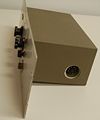122: Difference between revisions
No edit summary |
No edit summary |
||
| Line 31: | Line 31: | ||
The result is that the sensitive first and second stages have well filtered plate supplies. | The result is that the sensitive first and second stages have well filtered plate supplies. | ||
This technique is also seen in other gear from the era, such as the McIntosh MC-30 audio power amplifier. | This technique is also seen in other gear from the era, such as the McIntosh MC-30 audio power amplifier. | ||
The power requirements of the 122 are: | |||
* +135V at 5ma | |||
* -90V at 4ma | |||
* 6.3V at 0.9A | |||
==Manuals== | ==Manuals== | ||
Revision as of 12:09, 29 November 2015
The Tektronix 122 is an external low-frequency low-level preamplifier.
The low-frequency cutoff and high frequency cutoff can be selected. 40 kHz is the highest cutoff. The input is differential, using an XLR connector. The output is through a UHF (SO-239) connector, single-ended. The amplifier electronics are on a plastic board with metal studs where components are soldered in place. The board is mechanically isolated from the case by four rubber bushings.
The 122 has four stages of amplification. The first stage is a direct-coupled differential amplifier formed by both halves if a 12AX7 dual-triode tube. The total plate current of the input stage is about 450 μA.
The second stage is a 12AU7 differential amplifier, differentially driven by the first stage. There are DC blocking capacitors between plates of the first stage and the grids of the second stage. The second stage is coupled to the third stage by capacitors, which can be switched to select the low-frequency cutoff frequency. The third stage is a common-cathode amplifier formed from one half of a 12AU7 dual triode tube. The plate load resistors of the third stage amplifier are shunted by switchable capacitors, allowing the high-frequency cutoff to be selected. The resulting signal is buffered by a cathode-follower stage formed from the other triode in the third stage's 12AU7 tube, biased at 1.8 mA plate current. The output impedance is rated to be about 1000 Ω.
For low noise performance and freedom from oscillations, the power supplies in the 122 are carefully bypassed. The B+ supply of +135 VDC (along with -90 VDC and -6 VDC) comes into the 122 through an octal connector, typically from a Type 125 power supply. (Note: The 160 power supply is not compatible. The voltages are quite different.) The raw voltage coming in is used for the plate supply of the output (fourth) stage. That voltage is low-pass filtered to produce voltage "C" which is used as the plate supply for the third stage. Voltage "C" is low-pass filtered to produce voltage "B", the plate supply for the second stage. Finally, voltage "B" is low-pass filtered to produce voltage "A", the plate supply for the first stage. The result is that the sensitive first and second stages have well filtered plate supplies. This technique is also seen in other gear from the era, such as the McIntosh MC-30 audio power amplifier.
The power requirements of the 122 are:
- +135V at 5ma
- -90V at 4ma
- 6.3V at 0.9A
Manuals
Pictures
-
early model
-
early model
-
early model
-
early model
-
early model
-
early model
-
early model
-
-
late model
-
late model
-
late model
-
late model









